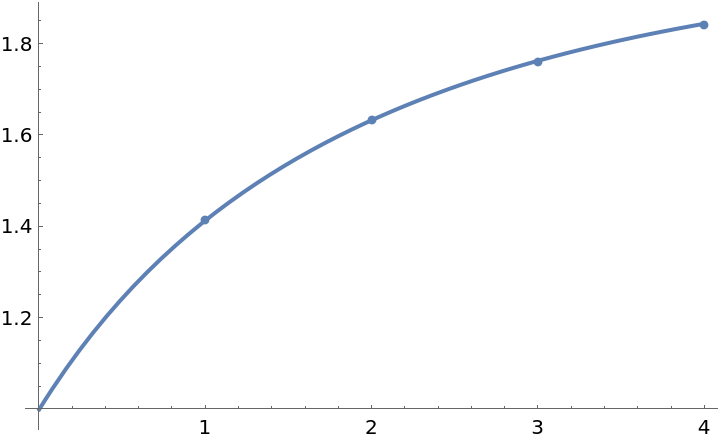Details and Options
For the for the continuous or fractional iteration of a function
f(x), dependent on continuous parameter
s∈ℝ,
fs(x) is called a
flow if it satisfies the condition

. Here, we work with finite iterations of a function so
ResourceFunction["FractionalIteration"] can be considered as a discrete analog to a flow; where
s is the integer number of iterations.
The following definitions are helpful for understanding ResourceFunction["FractionalIteration"]:
Hyperbolic fixed point - flow described by Schröder's equation for
ft(x) where
|f'(p)n|!=1 and fixed-point
p is not a super-attractor.
Rationally neutral fixed point - rationally neutral flow when f'(p) is a root of unity, f'(p)n=1, n∈ℕ.
Irrationally neutral fixed point - irrationally neutral flow when |f'(p)|=1.
ResourceFunction["FractionalIteration"] computes flows of iterated functions including hyperbolic, parabolic, rationally neutral and irrationally neutral.
Being able to take the flow of maps allows not only tetration to be extended to the complex numbers, but all the higher hyperoperators. See the Neat Examples.



![hyperbolicFlow = ResourceFunction["FractionalIteration"][f, t, 4, "FixedPoint" -> 0][
x];
error = (hyperbolicFlow /. t -> a /. x -> (hyperbolicFlow /. t -> b)) - (hyperbolicFlow /. t -> a + b);
Series[error, {x, 0, 4}]](https://www.wolframcloud.com/obj/resourcesystem/images/939/939465c7-7e06-4db2-85d6-550ef8da9322/231d1c542e3bb0be.png)
![ht[z_] := N[Sqrt[2.]^z];
flowOrder = 4;
tetration = ResourceFunction["FractionalIteration"][ht, x, flowOrder, "FixedPoint" -> 2][1];
Show[Plot[tetration, {x, 0, flowOrder}], ListPlot[NestList[ht, Sqrt[2.], flowOrder]]]](https://www.wolframcloud.com/obj/resourcesystem/images/939/939465c7-7e06-4db2-85d6-550ef8da9322/6608064ff6648958.png)
